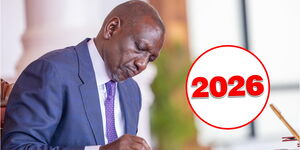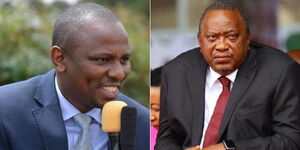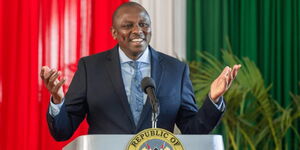President William Ruto’s administration has earmarked a portion of the Ksh156.8 billion World Bank budget support loan to settle approximately Ksh65.3 billion of a Eurobond maturing this month, according to Central Bank of Kenya (CBK) Governor Kamau Thugge.
Last week, the World Bank executive board approved the disbursement of Ksh156.8 billion ($1.2 billion) to Kenya, aimed at alleviating the government’s funding constraints. However, Governor Thugge on Thursday, June 6, revealed that part of this disbursement would be allocated to settle the $500 million (about Ksh65.3 billion) Eurobond.
The payment will settle the debut Eurobond, maturing on June 24, aiming to alleviate investor concerns that have adversely affected foreign exchange flows and led to a significant depreciation of the Kenyan shilling over the past year.
The government appears to be racing to prevent future concerns about the repayment of other outstanding Eurobonds. It has set a target for a second buyback of the notes this year, aiming for Ksh130.7 billion ($1 billion).
Earlier this year, in February, Kenya issued a $1.5 billion (about Ksh238 billion) international bond at a high cost to facilitate the buyback of a significant portion of the $2 billion (about Ksh261 billion) bond due this month. This strategic move was driven by fears that Kenya’s strained public finances might impede its ability to meet the bond's repayment obligations.
"We do expect some disbursements from the World Bank of about $1.2 billion (about Ksh156.8 billion at the current exchange rates) related to the development policy operations. Part of that will be used to settle the $500 million (about Ksh65.3 billion at the current exchange rate) of the remaining Eurobond," Thugge announced during a press conference.
Addressing questions about a World Bank report indicating the government’s plans for another buyback later this year, Thugge confirmed ongoing discussions with the Treasury but provided no further details.
The government has adopted a multi-faceted strategy to address the Ksh261 billion ($2 billion) Eurobond, which was scheduled for a lump-sum repayment on June 24.
By the end of 2024, the government aims to have repurchased notes worth Ksh326.7 billion ($2.5 billion), building on the February buyback. This includes a targeted buyback of Ksh130.7 billion ($1 billion) maturing in February 2028, which requires a single principal payment. To ease refinancing pressures, the latest issuance features a three-part redemption maturing in February 2031.
However, if Kenya issues new Eurobonds, it may face higher interest rates in the international markets. The country's total Eurobond debt stands at Ksh928 billion ($7.1 billion), with maturities extending to February 2048.
In February, the CBK and the National Treasury successfully orchestrated a buyback of notes worth Ksh196 billion ($1.5 billion) by issuing a new amortised Eurobond of equivalent value.
An amortised bond involves payments that cover both interest and principal. Initially, payments are interest-heavy, but as the bond matures, principal repayments increase.
The Treasury anticipated covering the remaining Eurobond balance through a mix of government funds and financing from multilateral and bilateral sources, including syndicated bank loans.
Treasury Cabinet Secretary Njuguna Ndung'u highlighted the government’s diversified strategy for retiring the Eurobond to reduce future interest expenses. "This diversified financing approach aims to maintain a relatively low weighted average interest rate in the overall public debt portfolio, ensuring Kenya's debt sustainability over the medium term," Ndung'u stated.
Besides repaying the 2024 Eurobond, the new World Bank financing is expected to enhance the availability of foreign exchange in the country, further stabilising the exchange rate.
Since the February buyback, the Kenyan shilling has strengthened, emerging as one of the world's best-performing currencies this year, with a year-to-date appreciation of Ksh16.7 per cent. It traded at Ksh130.71 against the US dollar as of Wednesday, June 5.
"The inflows and outflows of foreign exchange through the balance of payments will ultimately determine the level of the exchange rate," Dr Thugge added.
Despite recent flooding, the CBK maintains its economic growth forecast at 5.7 per cent for this year, citing resilience in the services sector and robust agricultural performance.
Kenya's economy is estimated to have grown by 5.8 per cent in the first quarter of this year, following a 5.6 per cent growth rate in 2023.












